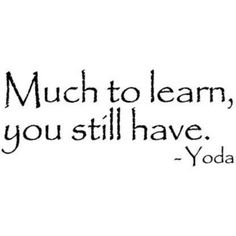I wanted to add to the great articles this month about mentoring Karrie’s blog Paying it Forward and Kirsty’s blog How to Be an Effective Mentor Part 1.
When we talk about having a mentor (or mentee), it sometimes sounds like a story right out of Star Wars. Obi-Wan Kenobi was a mentor who had many apprentices, like Luke and Anakin Skywalker. Obi-Wan helped his apprentices get in touch with their instinct and hone their skills. Both Luke and Anakin tested out those skills in real-life applications. There are elders like Jedi Master Yoda, who are highly respected for their experience, and who attract seekers looking to learn from their wisdom. The trade gets passed down from generation to generation through this mentorship.
In the real world, the mentor/mentee relationship is rarely as formal as Star Wars (although it would be cool to have a title like “Jedi Master”). Finding a mentor or mentee is a pretty organic process, sort of like making friends or dating. As you meet people, you’ll find some who you’re interested in or want to get to know more. Sometimes you only see them once or twice, and others turn into a long-term relationship. You naturally give and learn from each other, and offer support when needed. Long-term mentor/mentee relationships are pretty rare, and a lot of times are just a product of working together (such as an engineer and his/her long-time assistant).
Because those long-term mentoring relationships are so rare, I look at mentoring (or receiving mentorship) as something that we do – not a title we carry. It’s really in retrospect that we say, “That person was my mentor” or “I was his/her mentor” because it takes time to recognize that kind of relationship even exists. If you look at it more in the moment, it’s just learning, getting advice, or even just observing someone as they do their job. I think this is an important distinction because it changes the mindset from “who do I need to be around?” to “what can I learn in this situation? What can I learn from this person?”
From this mindset, mentoring (or receiving mentorship) becomes something that you can do regardless of how well you know someone – or know them at all. Some of my memorable mentee experiences include a one-hour phone call with an engineer I didn’t know; being invited to sit in on sessions and observe; industry talks and events where I spoke to the presenter afterward to ask questions or advice. I mentor through meeting with people (and offering advice) and writing blogs like this. If I’m working at a studio, I can tell pretty quickly which assistants or interns are looking to learn, and I’ll offer to let them sit in while I work. If there’s something unusual that comes up that’s a good learning opportunity; I’ll take the time to have them check it out, too.
When you lose the expectation about who will be your mentor (and focus more on “what can I learn”), you’ll also be more open-minded and aware of potential opportunities. If your focus is on building your network and relationships, those mentoring opportunities may naturally show up more (just like the old saying: “when the student is ready, the teacher will appear”).
Sometimes you will come across mentor/mentee relationships that are like Obi-Wan and Luke. If you feel a strong connection to your mentor, be careful of identifying or introducing yourself as their protege (versus their assistant, a colleague who’s teaching/helping you, etc.). It’s important to build a reputation for your strengths and talents, not just as a “mini-me” of someone else. Plus, when you say you’re someone’s protege, you’re also associating yourself with parts of that person (or their business) that you may want to distance from later. You may not know if someone has questionable ethics, or a history of an issue (personal or professional) that has tarnished their reputation. Just look at people like Martha Stewart, Paula Deen, or Phil Spector who’s professional credibility changed overnight because of choices made in their personal lives.
The best part about offering mentorship is that it’s a gift that continues to give. What mentees don’t always realize is that it can be as rewarding to the mentor as it is for them. There’s pride seeing someone you helped make strides in their career. I’ve seen more than once a mentee hire their mentor years later. For me, it’s therapeutic – while I had great mentors, I want to share the things I still had to figure out on my own. We’re lucky today that mentoring can go far beyond anything in the past – between Skype, Youtube videos, and blogs, we can offer our support to anyone in the world. In the end, it just helps us all do the craft better.
